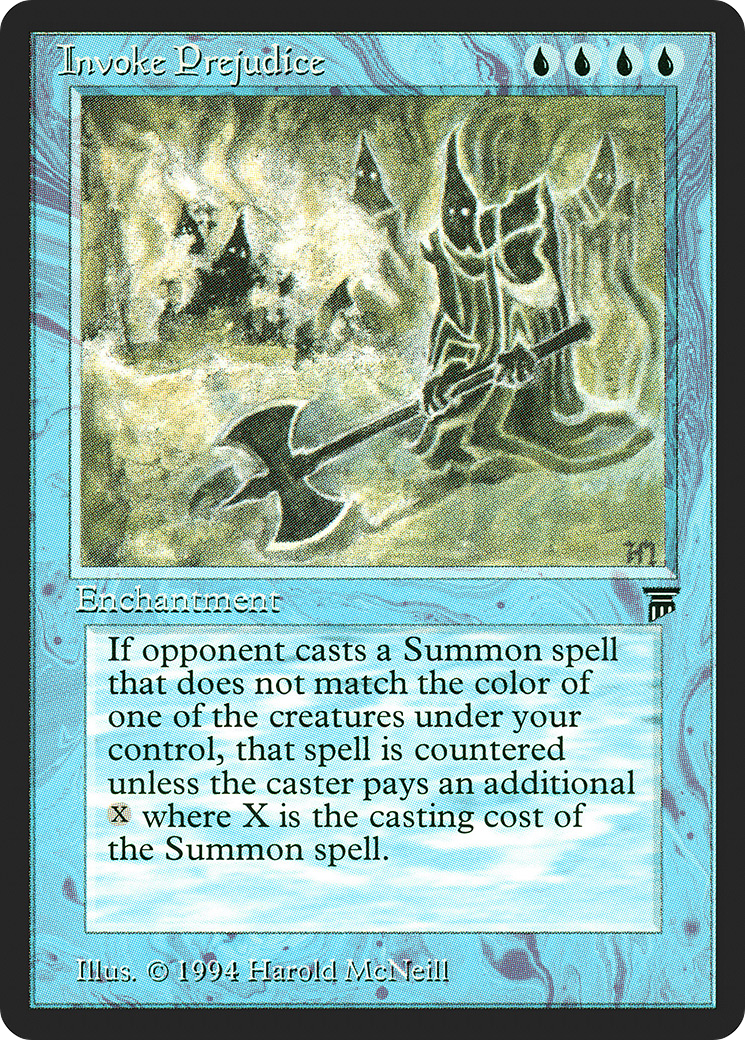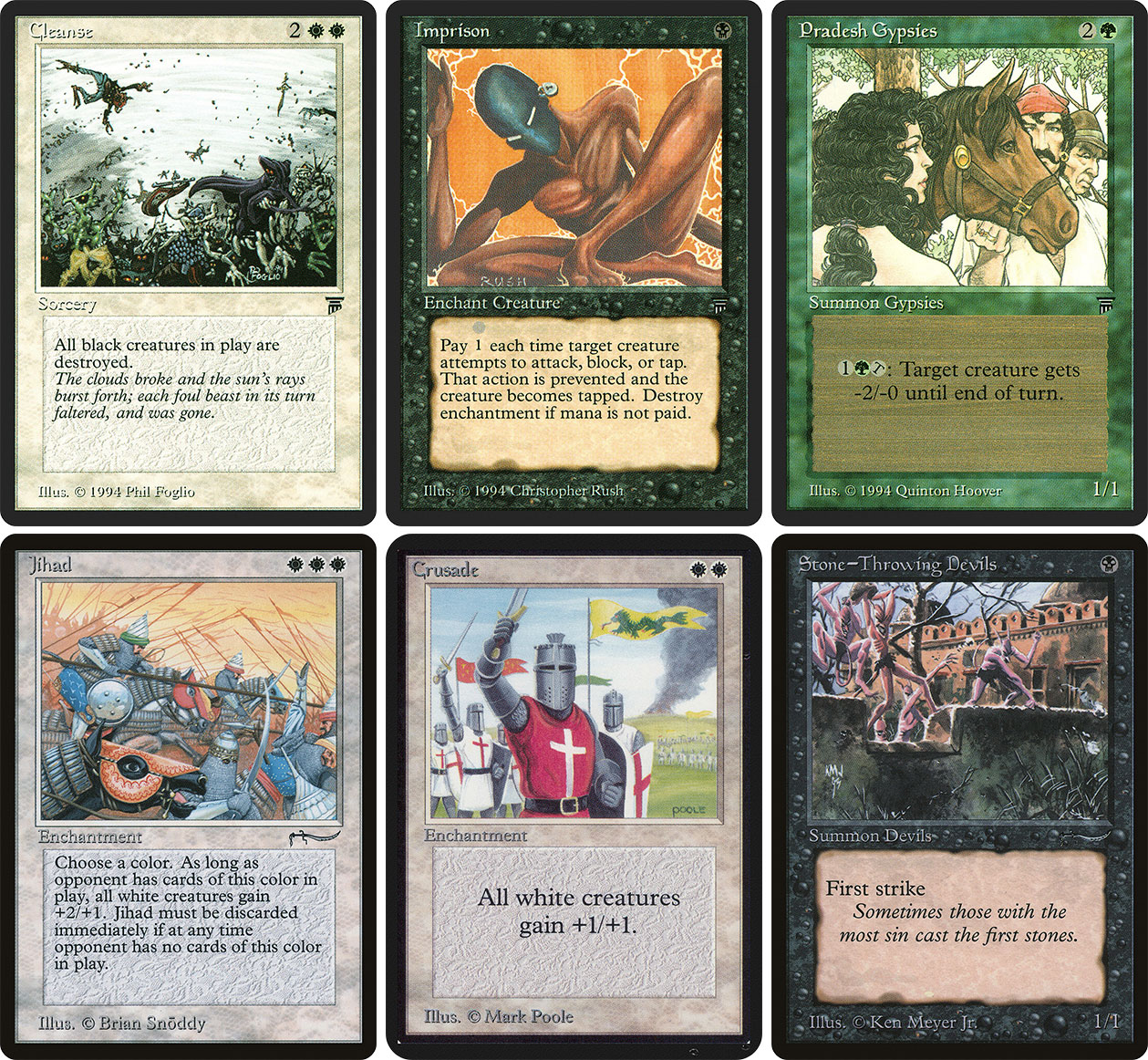Wizards of the Coast has removed images of seven cards from its online card database, Gatherer, and banned them from sanctioned play for depicting racism in either their art, name, or rules text. They also changed the Gatherer ID of Invoke Prejudice.
“The events of the past weeks and the ongoing conversation about how we can better support people of color have caused us to examine ourselves, our actions, and our inactions,” Wizards said. “To that end, we will also be removing a number of […] images from our database,” including:
Those images have been replaced with a statement that reads, “We have removed this card image from our database due to its racist depiction, text, or combination thereof. Racism in any form is unacceptable and has no place in our games, nor anywhere else.”
“There’s much more work to be done as we continue to make our games, communities, and company more inclusive,” Wizards acknowledged. “Know that we work every day to be better and that we hear you. We look forward to sharing more of our plans with you as our games and organization evolve.”
The Commander Rules Committee will follow suit and ban the seven cards in Commander, as well.
Invoke Prejudice
More than a few cards have been printed with racist or insensitive connotations in Magic’s 27-year history—but no card has warranted more criticism and controversy than Invoke Prejudice, which was printed in the Legends expansion in 1994.

Nearly every part of this card is problematic, from the name, art, artist, and rules text.
The name “Invoke Prejudice” quite obviously calls to mind the idea of racism while the ability, which makes different-colored creatures cost more, creates a version of in-game version racism/colorism.
The art, on the other hand, depicts axe-wielding hooded figures that look strikingly like members of the Klu Klux Klan. Perhaps that the meaning of the imagery could be explained away has happenstance—perhaps the artist didn’t know the name of the card?—except for the fact that the artist, Harold McNeill, is extremely problematic himself. His art frequently includes approving, even reverent, references to swastikas, Hitler, and other Nazi imagery.
As if that wasn’t enough, when you order Magic cards chronologically by set then alphabetically by card name, Invoke Prejudice is the 1488th card and was was therefore assigned the ID of 1488 in Gatherer. This number is significant to neo-Nazis because it references the white supremacist slogans of “14 words” and “Heil Hitler” (H is the eighth letter of the alphabet, so it can be represented by 88).
“Today, we will be changing the multiverse ID and removing the Gatherer card image for the card Invoke Prejudice,” Wizards said. “The card is racist and made even worse by the multiverse ID it was unfortunately codified with years ago. There’s no place for racism in our game, nor anywhere else.”
“But to that point, it should never have been published nor placed in the Gatherer. And for that we are sorry,” they continued. “We appreciate everyone helping us to recognize when we fall short. We should have been better, we can be better, and we will be better.”
The 6 Other Cards

The six other cards whose images will be removed from Gatherer and banned in sanctioned play are all problematic in their own ways.
Cleanse has very problematic text—destroy all Black creatures—and Imprison depicts a dark-skinned person being jailed, while both Stone-Throwing Devils and Pradesh Gypsies use slurs in their names. Jihad and Crusade, on the other hand, both invoke religious wars to give benefits to White creatures.
Racism and Diversity in Magic
The decision to ban these cards and remove their images from Gatherer comes more than two weeks after the murder of George Floyd at the hands of a Minneapolis police officer. Floyd’s death has sparked a nation-wide protest movement against racial injustice and police brutality and has forced many companies, including Wizards, to reckon with their own racism—implicit or explicit—and lack of diversity.
Wizards has taken increasing criticism over the last few weeks for being an extremely White company with very few African Americans, let alone people of color, in visible roles. Players like Lawrence Harmon and Zaiem Beg have written impassioned pieces about their experiences of racism in Magic and the stories they’ve heard from other members of the community, while others have pointed out that senior Wizards employees have a history of insensitive jokes and that Magic artists have historically been extremely male and white, with only three black women having published art on a Magic card.
Banning these seven cards is a small step—and one that some, including Harmon, see as overreaching—and does very little to fix the cultural and structural issues that Wizards and the larger Magic community have with race. For their part, Wizards appears to recognize this: “There’s much more work to be done as we continue to make our games, communities, and company more inclusive,” they said. “Know that we work every day to be better and that we hear you. We look forward to sharing more of our plans with you as our games and organization evolve.”

